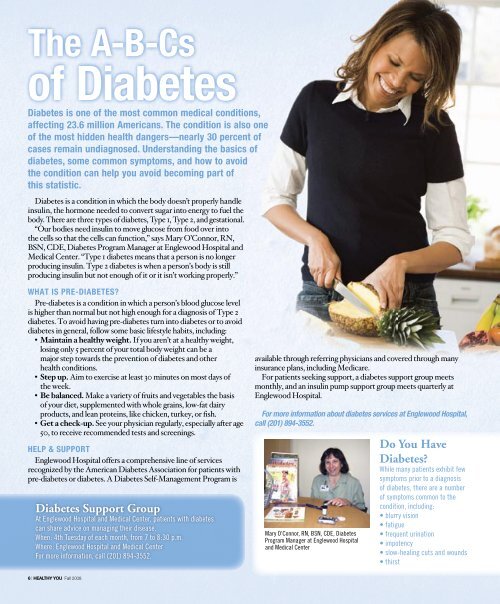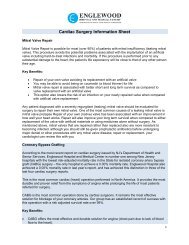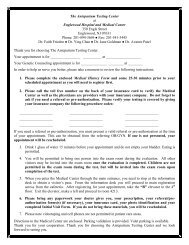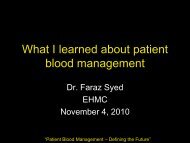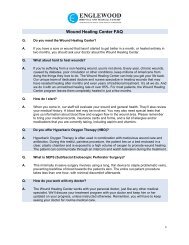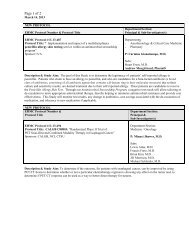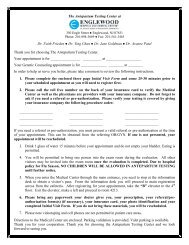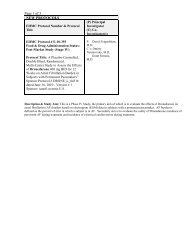Healthy You - Englewood Hospital and Medical Center
Healthy You - Englewood Hospital and Medical Center
Healthy You - Englewood Hospital and Medical Center
Create successful ePaper yourself
Turn your PDF publications into a flip-book with our unique Google optimized e-Paper software.
The A-B-Cs<br />
of Diabetes<br />
Diabetes is one of the most common medical conditions,<br />
affecting 23.6 million Americans. The condition is also one<br />
of the most hidden health dangers—nearly 30 percent of<br />
cases remain undiagnosed. Underst<strong>and</strong>ing the basics of<br />
diabetes, some common symptoms, <strong>and</strong> how to avoid<br />
the condition can help you avoid becoming part of<br />
this statistic.<br />
Diabetes is a condition in which the body doesn’t properly h<strong>and</strong>le<br />
insulin, the hormone needed to convert sugar into energy to fuel the<br />
body. There are three types of diabetes, Type 1, Type 2, <strong>and</strong> gestational.<br />
“Our bodies need insulin to move glucose from food over into<br />
the cells so that the cells can function,” says Mary O’Connor, RN,<br />
BSN, CDE, Diabetes Program Manager at <strong>Englewood</strong> <strong>Hospital</strong> <strong>and</strong><br />
<strong>Medical</strong> <strong>Center</strong>. “Type 1 diabetes means that a person is no longer<br />
producing insulin. Type 2 diabetes is when a person’s body is still<br />
producing insulin but not enough of it or it isn’t working properly.”<br />
WHAT IS PRE-DIABETES?<br />
Pre-diabetes is a condition in which a person’s blood glucose level<br />
is higher than normal but not high enough for a diagnosis of Type 2<br />
diabetes. To avoid having pre-diabetes turn into diabetes or to avoid<br />
diabetes in general, follow some basic lifestyle habits, including:<br />
• Maintain a healthy weight. If you aren’t at a healthy weight,<br />
losing only 5 percent of your total body weight can be a<br />
major step towards the prevention of diabetes <strong>and</strong> other<br />
health conditions.<br />
• Step up. Aim to exercise at least 30 minutes on most days of<br />
the week.<br />
• Be balanced. Make a variety of fruits <strong>and</strong> vegetables the basis<br />
of your diet, supplemented with whole grains, low-fat dairy<br />
products, <strong>and</strong> lean proteins, like chicken, turkey, or fish.<br />
• Get a check-up. See your physician regularly, especially after age<br />
50, to receive recommended tests <strong>and</strong> screenings.<br />
HELP & SUPPORT<br />
<strong>Englewood</strong> <strong>Hospital</strong> offers a comprehensive line of services<br />
recognized by the American Diabetes Association for patients with<br />
pre-diabetes or diabetes. A Diabetes Self-Management Program is<br />
Diabetes Support Group<br />
At <strong>Englewood</strong> <strong>Hospital</strong> <strong>and</strong> <strong>Medical</strong> <strong>Center</strong>, patients with diabetes<br />
can share advice on managing their disease.<br />
When: 4th Tuesday of each month, from 7 to 8:30 p.m.<br />
Where: <strong>Englewood</strong> <strong>Hospital</strong> <strong>and</strong> <strong>Medical</strong> <strong>Center</strong><br />
For more information, call (201) 894-3552.<br />
6 ¦ HEALTHY YOU Fall 2008<br />
available through referring physicians <strong>and</strong> covered through many<br />
insurance plans, including Medicare.<br />
For patients seeking support, a diabetes support group meets<br />
monthly, <strong>and</strong> an insulin pump support group meets quarterly at<br />
<strong>Englewood</strong> <strong>Hospital</strong>.<br />
For more information about diabetes services at <strong>Englewood</strong> <strong>Hospital</strong>,<br />
call (201) 894-3552.<br />
Mary O’Connor, RN, BSN, CDE, Diabetes<br />
Program Manager at <strong>Englewood</strong> <strong>Hospital</strong><br />
<strong>and</strong> <strong>Medical</strong> <strong>Center</strong><br />
Do <strong>You</strong> Have<br />
Diabetes?<br />
While many patients exhibit few<br />
symptoms prior to a diagnosis<br />
of diabetes, there are a number<br />
of symptoms common to the<br />
condition, including:<br />
• blurry vision<br />
• fatigue<br />
• frequent urination<br />
• impotency<br />
• slow-healing cuts <strong>and</strong> wounds<br />
• thirst


